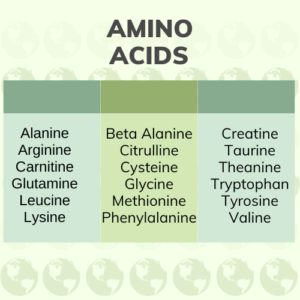Amino acids are organic compounds that play a vital role in many biological processes,  including protein synthesis, energy production, and nutrient absorption. In total, there are 20 amino acids that humans require to function, 9 of which are essential amino acids. Essential amino acids cannot be produced by the human body. Due to this, amino acid supplements and foods containing added amino acids have become increasingly popular. Including amino acids in your companies’ product formulations can help enhance their nutritional value and improve their functionality. Whether you are developing supplements, energy drinks, or animal feed, amino acids can help you create products that stand out from the competition.
including protein synthesis, energy production, and nutrient absorption. In total, there are 20 amino acids that humans require to function, 9 of which are essential amino acids. Essential amino acids cannot be produced by the human body. Due to this, amino acid supplements and foods containing added amino acids have become increasingly popular. Including amino acids in your companies’ product formulations can help enhance their nutritional value and improve their functionality. Whether you are developing supplements, energy drinks, or animal feed, amino acids can help you create products that stand out from the competition.
Benefits & Label Attributes
Improving Nutritional Value:
One of the primary applications of amino acids in food and beverage manufacturing is to improve the nutritional value of finished products. Amino acids are the building blocks of proteins and are required as part of the diet to ensure proper protein synthesis. Amino acids also facilitate the absorption of other nutrients in the body. They play a vital role in transporting minerals, vitamins, and other essential nutrients across cell membranes. In product formulations, amino acids are used as improve the nutritional value in various food products, such as sports nutrition products, infant formulas, and meal replacements. These supplements help in meeting the protein requirements of consumers, especially those who have a vegetarian or vegan diet.
Enhancing Flavor:
Amino acids are also used to enhance the flavor of food and beverage products. Many meat aromas and savory natural flavors are made through the combination of amino acids and peptides. The umami taste present in MSG, which is the fifth basic taste, is the salt derived from the amino acid glutamine. Glutamine and MSG are used as flavor enhancers in various food products, such as soups, sauces, and snacks. Some amino acids, such as glycine, have the ability to mask or reduce off-flavors in food and beverages. By strategically using amino acids, manufacturers can minimize undesirable tastes, bitterness, or aftertaste, resulting in a more pleasant and balanced flavor profile.
Extending Shelf Life:
Amino acids are also used as preservatives in some food and beverage products to extend their shelf life. Many fruit-based beverages contain cysteine as an antioxidant. The addition of cysteine aids in maintaining freshness and preventing oxidization. Certain amino acids, like lysine and arginine, have been found to exhibit antimicrobial properties. These amino acids can inhibit the growth of pathogenic bacteria and spoilage microorganisms. Amino acids are also used in the production of cured meats, such as ham and sausage, to prevent bacterial growth and improve the texture of the product.
Texture and Appearance:
Amino acids can aid in emulsification, stabilization, and enhancing the mouthfeel of products- especially sauces, soups, and dressings. Amino acids are also used as texturizing agents in the production of meat substitutes, such as tofu and tempeh. Another amino acid, cysteine, is used as a dough conditioner to improve the elasticity, texture, and overall sensory experience of bakery products.
Product Applications of Amino Acids
Amino Acids in Supplements
Amino acid supplements that have historically been popular with bodybuilders and performance athletes are becoming increasingly popular among the average consumer looking to improve their overall health. Amino acid supplements are available in various forms, including powders, capsules, gels, and liquids. The most common amino acid supplements are branched-chain amino acids (BCAAs), which include leucine, isoleucine, and valine. BCAAs are essential amino acids that cannot be produced by the body and must be obtained through diet or supplementation.
BCAAs are believed to help increase muscle mass, reduce muscle soreness, and improve exercise performance. Several studies have shown that BCAA supplementation can help reduce muscle damage and fatigue during exercise, leading to faster recovery times.
Other amino acid supplements, such as arginine, creatine, and glutamine, are also popular among athletes and bodybuilders. Arginine is believed to improve blood flow and increase muscle pump during exercise, while glutamine is thought to aid in muscle recovery and improve immune function.
Amino Acids in Energy Drinks
Energy drinks are popular among people looking for a quick energy boost. Many energy drinks contain high levels of caffeine and other stimulants, but the opportunity for manufacturers to target the better-for-you sector with natural energy products still exists.
Taurine is a common amino acid found in many energy drinks. Taurine is believed to help improve athletic performance and reduce muscle damage during exercise.
Another amino acid commonly found in energy drinks is tyrosine. Tyrosine is believed to improve cognitive function and reduce mental fatigue. These nootropic benefits make tyrosine an ideal ingredient in many of the modern better-for-you energy drinks that improve mood, mental function, and focus.
By incorporating amino acids into energy bars, drinks, or other products, manufacturers can offer consumers a sustained energy boost while providing additional nutritional benefits.
Amino Acids in Animal Feed
Amino acids are also commonly used in animal feed to improve the nutritional value of the feed and promote animal growth and health. Amino acid supplementation in animal feed can help reduce the amount of protein needed in the feed, leading to cost savings and reduced environmental impact.
The most common amino acids used in animal feed are lysine, methionine, and threonine. These amino acids are essential for animal growth and development, and they must be obtained through diet.
Amino acid supplementation in animal feed has been shown to improve animal growth and feed efficiency. This can lead to increased profits for farmers and a more sustainable and efficient animal agriculture industry.
AIFI’s Amino Acids
We help our customers source innovative ingredients and develop new supplier options. If you are interested in learning more about our line of amino acids, pricing , or any of our other product offerings contact us
